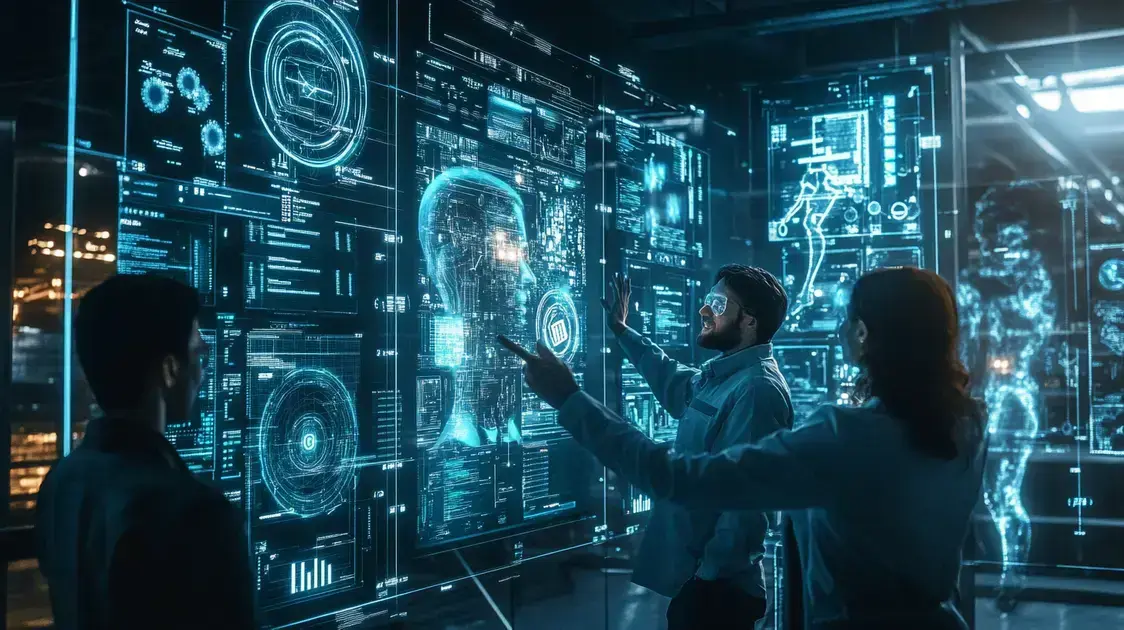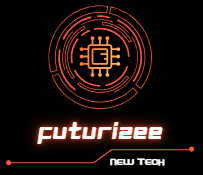AI in the workforce is revolutionizing how employees engage with their tasks, automating repetitive processes and allowing for greater efficiency. By streamlining workflows, AI enables professionals to focus on strategic and creative aspects of their roles, ultimately enhancing workplace productivity.
Beyond automation, AI fosters collaboration by integrating intelligent systems into daily operations. It promotes continuous learning, helping employees develop new skills and adapt to evolving industry demands. This shift not only increases job satisfaction but also drives workplace innovation.
As industries embrace AI in the workforce, it is crucial to understand both the opportunities and challenges it presents. Exploring its impact can help employees and businesses navigate this transformation effectively. Keep reading to uncover how AI is shaping the future of work.
Understanding AI in the Workforce
Understanding AI in the workforce is essential for navigating the evolving landscape of work. Artificial Intelligence refers to the simulation of human intelligence processes by machines, particularly computer systems. These processes can include learning, reasoning, and self-correction. As organisations adopt AI technologies, their operations and the roles of their employees are undergoing a significant transformation.
The Role of AI in Today’s Work Environment
AI is quickly becoming a vital tool in various industries. From automating routine tasks to providing data-driven insights, AI helps businesses operate more efficiently. This shift means that employees must adapt to working alongside these intelligent systems, enhancing overall productivity.
Types of AI Technologies Used in the Workforce
Common AI technologies include machine learning, natural language processing, and robotics. Each of these areas contributes uniquely to the workforce:
- Machine Learning: This allows systems to learn from data patterns and make predictions or decisions without explicit programming.
- Natural Language Processing: This enables machines to understand and interpret human language, improving communication between employees and technology.
- Robotics: Robots automate physical tasks, freeing human workers to focus on more complex responsibilities.
The Importance of Training and Upskilling
As AI integrates into different roles, the need for employee training becomes critical. Workers must develop skills to effectively use AI tools. Upskilling initiatives can help bridge the knowledge gap, ensuring employees can leverage AI to enhance their performance.
Employee Mindset Towards AI
Adopting a positive mindset towards AI is crucial. Instead of viewing AI as a replacement, workers should consider it a partner that enhances their abilities. With proper understanding, employees can harness AI to improve their work quality and efficiency.
In summary, understanding AI in the workforce means recognising its influence on job roles, technology interactions, and the necessity for continuous learning. Embracing AI can lead to exciting opportunities for growth and innovation in the workplace.
The Rise of Automation
The rise of automation is a significant trend in the workforce today. Automation refers to the use of technology to perform tasks without human intervention. This shift is primarily driven by advancements in artificial intelligence and robotics, enhancing productivity and efficiency in various sectors.
How Automation is Transforming Industries
Various industries are embracing automation:
- Manufacturing: Industries have automated assembly lines to increase production speed and consistency.
- Retail: Automated checkouts and inventory management systems help streamline customer transactions and stock control.
- Healthcare: Robots assist in surgery and delivery of medications, minimising errors and improving patient care.
The Impact on Workforce Dynamics
As automation rises, employee roles are changing. Routine tasks that were once done manually are now handled by machines. For instance, data entry jobs are being automated, pushing employees to take on more analytical and strategic responsibilities.
Benefits of Automation for Businesses
Automation provides numerous advantages for companies:
- Increased Efficiency: Tasks are completed faster and with fewer errors.
- Cost Savings: Reducing labour costs and operational expenses makes businesses more competitive.
- Enhanced Data Analysis: Automated systems can process large amounts of data, providing valuable insights.
Societal Considerations
Although automation leads to many benefits, it also raises concerns. Job displacement is a significant issue, as employees in routine roles may find themselves unemployed. Therefore, companies must consider reskilling and upskilling their workforce to mitigate this impact.
In conclusion, the rise of automation presents both opportunities and challenges for the workforce. By embracing this change and preparing employees for new roles, businesses can ensure they stay competitive in an increasingly automated world.
Benefits of AI for Employees

The benefits of AI in the workforce are numerous and impactful, transforming how employees interact with technology and perform their daily tasks. As companies integrate AI into their operations, workers can experience significant improvements in their work environments, job satisfaction, and productivity levels. The shift toward AI-driven workplaces is redefining traditional job roles and creating new opportunities for growth.
Enhanced Productivity
One of the biggest advantages of AI in the workforce is its ability to automate time-consuming tasks, such as data entry and document sorting. By handling repetitive processes, AI allows employees to focus on more complex and strategic activities that require creativity and problem-solving. As a result, workers become more engaged and efficient in their roles.
Improved Decision-Making
AI can analyze vast amounts of data quickly and accurately, providing employees with valuable insights that help them make informed decisions. With real-time data processing, workers can rely on AI in the workforce to guide their choices, improve business strategies, and enhance overall efficiency. This access to data-driven insights significantly boosts employees’ effectiveness in their respective roles.
Increased Job Satisfaction
As AI automates routine and repetitive tasks, employees have more opportunities to concentrate on meaningful and rewarding work. Many workers report higher job satisfaction when they can engage in tasks that add value and align with their skills. With AI in the workforce, companies can create a more stimulating work environment that fosters motivation and long-term employee retention.
Support for Skill Development
The growing presence of AI in the workforce encourages companies to invest in training programs that help employees adapt to new technologies. Businesses frequently provide upskilling initiatives to ensure workers can maximize AI tools effectively. This ongoing learning fosters career development and equips employees with relevant skills for an evolving job market.
Flexibility in the Workplace
AI’s ability to streamline operations often leads to more flexible working arrangements. Employees can benefit from remote work opportunities, personalized work schedules, and improved work-life balance. As companies continue to integrate AI-driven solutions, workplaces become more adaptable, catering to the diverse needs of their workforce.
In summary, the introduction of AI in the workforce is reshaping the professional landscape by enhancing productivity, decision-making, and overall job satisfaction. As AI continues to evolve, businesses and employees alike must embrace its potential to create a more innovative and efficient work environment.
Impact of AI on Job Roles
The impact of AI on job roles is profound, transforming how employees perform their tasks and interact with technology. As AI continues to be integrated into various industries, job roles are evolving in several ways.
Job Creation and Transformation
While AI may eliminate certain positions, it also creates new opportunities. Roles in data science, machine learning, and AI maintenance are increasingly in demand. Existing roles are being transformed, requiring employees to take on more complex tasks that involve decision-making and creativity.
Shift in Skill Requirements
As AI automates routine tasks, the skills needed in the workplace are changing. Employees are now expected to possess advanced technical skills to work with AI systems. Skills such as data analysis, programming, and critical thinking are becoming essential for many job roles.
Increased Collaboration Between Humans and Machines
In many workplaces, the focus is shifting towards collaboration between humans and AI. Employees are expected to work alongside AI tools that assist in their daily tasks. This collaboration can enhance productivity but may also require workers to adapt to new workflows.
Changes in Management and Leadership Roles
Management positions are also evolving with the introduction of AI. Leaders must understand how to integrate AI into their teams effectively. They need to manage not only human resources but also AI systems, ensuring that both work together to achieve company goals.
Impact on Employee Roles in Various Industries
In the healthcare industry, for instance, AI is assisting doctors with diagnostics and patient management, allowing healthcare professionals to focus more on patient care. In marketing, AI tools analyse consumer data to create targeted campaigns, leading to more strategic roles for marketers. Each sector is seeing a unique transformation in job roles due to AI.
Understanding the impact of AI on job roles is vital for both employees and employers. By recognising these changes, organisations can better prepare their workforce for a future that increasingly relies on AI technologies.
Integrating AI into Company Culture

Integrating AI into company culture is crucial for successful implementation and long-term sustainability. When AI becomes part of an organisation’s culture, it fosters openness and innovation among employees.
Creating a Supportive Environment
For AI integration to succeed, companies need to create a supportive atmosphere. This involves investing in training and resources to help employees understand AI tools. Regular workshops can empower staff by enhancing their skills and boosting their confidence when working with AI.
Encouraging Collaboration
AI should not be seen as a replacement for human effort but rather as a tool for collaboration. Encouraging teams to work together with AI systems can lead to better results. Employees feel valued when they know their expertise complements AI capabilities.
Communicating the Benefits of AI
Employees should be informed about the advantages of integr
Future Predictions for AI in Workplaces
ating AI. Clear communication around how AI can make their jobs easier or more fulfilling is key. By understanding the positive impacts, workers may be more open to adopting new technologies.
Being Open to Feedback
Creating an open feedback loop allows employees to share their experiences with AI tools. This feedback can guide companies in making adjustments to ensure that AI is user-friendly and effective. Employees who feel heard are more likely to engage with AI initiatives.
Promoting a Culture of Continuous Learning
With the rapidly changing technology landscape, having a culture of continuous learning is essential. Companies should encourage employees to pursue further education and stay updated on AI advancements. This commitment to lifelong learning helps individuals adapt to ongoing changes in their roles.
Integrating AI into company culture not only enhances productivity but also cultivates a workforce that is agile and prepared for future challenges. By prioritizing these elements, organisations can ensure the successful adoption of AI technologies.
The future predictions for AI in workplaces suggest transformative changes that will shape how businesses operate and how employees perform their roles. As AI technology continues to evolve, we can expect several key developments.
Increased Automation of Routine Tasks
In the coming years, more routine tasks will be automated. This means that employees will spend less time on repetitive tasks and more focus on complex problem-solving and creative work. This shift will enhance job satisfaction and productivity.
AI as a Personal Assistant
AI will increasingly function like a personal assistant for employees. Tools that manage schedules, email, and other daily tasks will become more advanced, helping workers optimise their time and efficiency.
Enhanced Collaboration Tools
Collaboration will improve as AI-powered tools facilitate better communication among teams, regardless of location. AI can help in managing projects, tracking progress, and promoting teamwork by analysing data and providing insights in real-time.
Customised Employee Training
Future AI systems will offer tailored training programs based on individual employee needs. Adaptive learning technologies will analyse performance and provide personalised recommendations. This will support continuous development and skill advancement.
Data-Driven Decision Making
AI’s ability to analyse large datasets will lead to more informed decision-making processes. Managers will rely on AI insights to make strategic choices, leading to increased efficiency and effectiveness in operations and strategy.
Heightened Focus on Ethical AI
As AI becomes more integrated into workplaces, there will be a growing emphasis on ethical considerations. Companies will need to address issues related to privacy, bias, and transparency. Establishing ethical guidelines for AI use will be essential for maintaining employee trust.
Overall, the future of AI in workplaces is promising, with the potential for great advancements that can reshape the entire work experience for employees and organisations alike.
Embracing the Future of AI in the Workforce
The integration of AI in the workforce is no longer a distant possibility—it is a present reality reshaping how businesses operate and employees perform their tasks. From automating routine processes to enhancing decision-making and collaboration, AI is transforming industries, improving productivity, and redefining job roles. While concerns about job displacement exist, the opportunities for growth, innovation, and skill development outweigh the challenges.
As companies continue adopting AI in the workforce, it is crucial to focus on training, upskilling, and fostering a culture of adaptability. Employees who embrace AI as a tool for efficiency rather than a replacement will find themselves better equipped for the evolving job market. Business leaders must also ensure ethical AI implementation, prioritizing transparency and fairness in their strategies.
The future of AI in the workforce promises a more dynamic, efficient, and innovative professional landscape. Those who understand and leverage AI’s potential will not only thrive in their careers but also contribute to shaping a smarter and more productive work environment.
Check out our article on AI in Customer Experience to discover how artificial intelligence is enhancing customer service and satisfaction.
